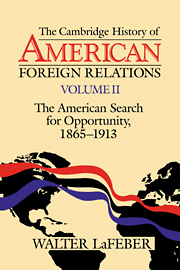Book contents
- Frontmatter
- 1 Springboards and strategies
- 2 The second Industrial Revolution at home and abroad
- 3 Race for empire
- 4 “America Will Take This Continent in Hand Alone”
- 5 Crossing the oceans
- 6 1893–1896: chaos and crises
- 7 The empire of 1898 – and upheaval
- 8 Pacific empire – and upheaval
- 9 Theodore Roosevelt: conservative as revolutionary
- 10 William Howard Taft and the age of revolution
- Conclusion: The 1865–1913 Era Restated
- Bibliographic Essay
- Index
- THE CAMBRIDGE HISTORY OF AMERICAN FOREIGN RELATIONS
- References
4 - “America Will Take This Continent in Hand Alone”
Published online by Cambridge University Press: 28 March 2008
- Frontmatter
- 1 Springboards and strategies
- 2 The second Industrial Revolution at home and abroad
- 3 Race for empire
- 4 “America Will Take This Continent in Hand Alone”
- 5 Crossing the oceans
- 6 1893–1896: chaos and crises
- 7 The empire of 1898 – and upheaval
- 8 Pacific empire – and upheaval
- 9 Theodore Roosevelt: conservative as revolutionary
- 10 William Howard Taft and the age of revolution
- Conclusion: The 1865–1913 Era Restated
- Bibliographic Essay
- Index
- THE CAMBRIDGE HISTORY OF AMERICAN FOREIGN RELATIONS
- References
Summary
The 1865–1912 era in U.S.–Latin American relations began with Secretary of State William Seward forswearing landed conquest in Mexico and the Congress rejecting footholds in the Caribbean– Central American region, even when tempted by the centuries-old dream of exclusive rights to an isthmian canal. The era ended with the United States exclusively owning and fortifying the canal, militarily and economically dominating the Caribbean through a network of bases, occupying Nicaragua with U.S. Marines, and verging on an invasion of Mexico. Clearly these years are pivotal in understanding how the Monroe Doctrine of 1823, which ruled out foreign interference in Latin American affairs, became the Monroe Doctrine of 1912, which justified unilateral U.S. intervention in those affairs.
It is equally clear, given the prominence of U.S. military forces in the region after the 1880s, that the nation’s foreign policies did not primarily seek order and stability in Latin America. They instead placed the greatest emphasis on obtaining economic opportunity and strategic footholds from which they could move to obtain further opportunities. These policies, even by the early 1890s, led to disorder and clashes that, in turn, helped pressure U.S. officials to build the naval forces necessary to maintain their new interpretations of the Monroe Doctrine.
- Type
- Chapter
- Information
- The Cambridge History of American Foreign Relations , pp. 60 - 82Publisher: Cambridge University PressPrint publication year: 1993



